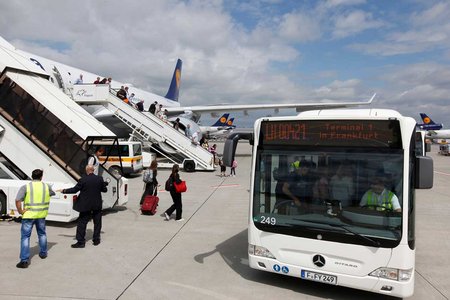Overview
|
Research project |
DIESELFREI – Direct thermal storage testing in electric buses to reduce immissions |
|---|---|
|
Faculty |
Engineering |
|
Institute |
Institut für nachhaltige Mobilität und Energie (INME) (Institute for Sustainable Mobility and Energy) |
|
Project head |
Prof. Dr.-Ing. Stefan Rusche |
|
Contact person research funding |
Dr. Michael Anton |
|
Project partners |
Konvekta AG Associated partners: ESWE Verkehrsgesellschaft mbH, Flughafen Stuttgart GmbH, Fraport AG |
|
Sponsors |
State of Hesse (Hessian Ministry for Economic Affairs, Energy, Transport and Regional Development), Promotion of electromobility in Hesse |
|
Duration |
July 01, 2019 – July 01, 2021 |
Project description
The energy consumption required for heating and cooling plays a major role not only in the operation of buses on the airport apron, but also in urban traffic. If today’s electric buses have a specified range of approx. 200 km and the energy for thermal management is taken from the battery, this can lead to severe restrictions in the deployment of the buses both in summer and even more so in winter. But bus outages due to temperature-related range problems inevitably lead to acceptance problems among both operators and customers.
Electric buses can only have a local zero-emission status if heating or air-conditioning is really carried out without using fossil fuels. However, not using combustion engines to drive compressors and diesel-fired water heaters for heating poses a risk. Purely electric heating or cooling reduces the range of the buses, so that using heat pumps (especially with thermal storage) is the only way to solve this problem. However, the question arises as to how far this increases the range and how significant the actual reduction in CO2 emissions and energy consumption is when electric buses are used, depending on the technical equipment and the operating conditions. The way they operate in practice is what counts, and therefore different heating and cooling concepts in vehicles that are as identical as possible and have identical operating schedules must be identified and compared, if possible, over the course of an entire year. Insights into the reliability of the systems used are also expected to be gained. The results of this project will serve as a decision-making aid for future acquisitions by fleet operators.
